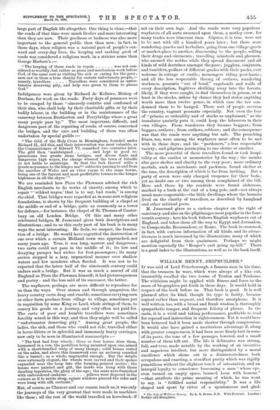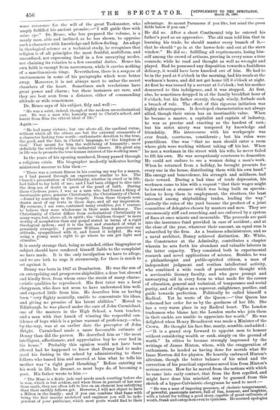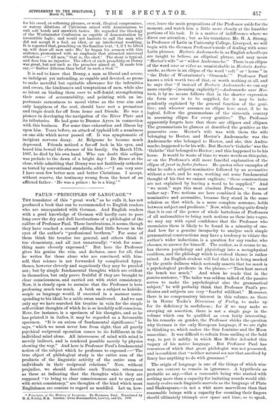WILLIAM DENNY, SHIPBUILDER.*
IT was said of Lord Peterborough, a famous man in his time, that the trousers he wore, which were always of a like cut, irresistibly recalled the two towns of Toulon and Toulouse. The witticism might be applied with fitness and force to the mass of biographies put forth in these days. It would hold in respect of the book before us. That book is good. It is well planned after its kind, though its type is faulty, because topical rather than sequent, and therefore amorphous. It is well written, too, with a broad and frank wisdom,ra thoroughly sympathetic temper, and frequent felicity of phrase. In the main, it is a vivid and taking performance, profitable to read for reproof and instruction in righteousness. Yet it would have been bettered had it been made shorter through compression. It would also have gained a meritorious advantage if, along with greater compactness, it had been more firmly knit in some of its parts, the tone of a few passages lowered, and a small number of them left out. The life it delineates was strong, full, and true, made notable by the working of an inventive and sagacious intellect, but more distinguished by a moral excellence which shone out in a disinterestedness both scrupulous and exacting, a steadfast purity which was rigidly punctilious without the slightest touch of ostentation, and an intrepid loyalty to conscience beseeming a man " whose eye, even turned on empty space, beamed keen with honour," —that attribute the prime meaning of which, he was wont to say, is " fulfilled social responsibility." It was a life shaped and spent by virtue of a spontaneous and glad- • The Life of William Denny. By A. B. Brace, D.D. With Portrait. London : Hodder and Stoughton.
some reverence for the will of the great Taskmaster, who amply fulfilled his ancient promise,—" I will guide thee with mine eye." Dr. Bruce, who has prepared the volume, is a manly man, able and inclined, as he has shown, to appraise such a character with knowledge and fellow-feeling. An adept in theological science as a technical study, he recognises that religion is of all principles the most fruitful, multiform, and unconfined, not expressing itself in a few unvarying modes, nor chaining its votaries to a few essential duties. Hence his own faith is exempt from narrowness, while it carries nothing of a sanctimonious tinge. Nevertheless, there is a soupcon of unctuousness in some of his paragraphs which were better away. Moreover, it is not always meet to unbar the secret chambers of the heart. Sometimes such revelations have great power and charm ; but these instances are rare, and they are best seen from a distance, either of commanding altitude or wide remoteness.
Dr. Bruce says of his subject, fitly and well :—
"He was a saint, indeed, though of the modern un-ecclesiastical sort. He was a man who honestly went to Christ's school, and learnt from Him the ethical ideal of life."
Again :-
" He had many virtues ; but one above all, the cardinal virtue, without which all the others are but the external ornaments of a character lacking true worth—enthusiastic devotion to the true, the good, and the fair, in Christ's language, to the kingdom of God.' That meant for him the well-being of humanity ; more definitely the well-being of the industrial classes. His great aim in life was to promote the true human interest of the working man."
In the years of his opening manhood, Denny passed through a religious crisis. His biographer modestly indicates having ministered succour to him then :-
" There was a certain fitness in his coming my way for a season, as I had passed through an experience similar to his. The Church's presentation of Christianity, whether in creed or in life, had failed to lay hold of me ; and I had been obliged to dive into the deep sea of doubt in quest of the pearl of faith. During those Cardross years, I was as a man who had found a thing of inestimable price, genuine Christianity, the Christianity of Christ, —found by searching in the Gospels. From these Gospels were drawn most of my texts in those days, and all my inspiration. My sermons, I am sure, contained many crudities, yet I venture to believe they were wholesome in their main tendency. The Christianity of Christ differs from ecclesiastical Christianity in many ways, but, above all, in spirit ; the ` Galilean Gospel' is more worthy of acceptation than any gospel stated in terms of a rigid theological system ; and it is the test and standard of what is genuinely evangelic. I presume William Denny perceived my attitude, sympathised with it, and found it helpful. He was using a young man's right to go where he can get light and stimulus."
It is surely strange that, being so minded, either biographer or subject should have rendered himself liable to the complaint we have made. It is the only inculpation we have to allege, and we are loth to urge it strenuously, for there is much to
set against it.
Denny was born in 1847 at Dumbarton. He was the son of an enterprising and prosperous shipbuilder, a dour but shrewd and kindly Scot, from whom came the strain of many charac- teristic qualities he reproduced. His first tutor was a local clergyman, who does not seem to have understood him well,
and expected little from him. He describes him as having been " very flighty mentally, unable to concentrate his ideas, and giving no promise of his latent abilities." Moved to Edinburgh, he was placed -under the care of John Carmichael, one of the masters in the High School, a born teacher,
and a man with that knack of winning the respectful con- fidence of boys which is a prime warrant of proficiency,—who,
by-the-way, was at an earlier date the preceptor of John Bright. Carmichael made a more favourable estimate of Denny than did the parson. He described him as " the most intelligent, affectionate, and appreciative boy he ever had in his house." Probably this opinion would not .have been altered had he happened to know that Denny had to make good his footing in the school by administering to three fellows who teased him and sneered at 'him what he tells his mother was " a right good thrashing." Before entering on his work in life, he dreamt, as most boys do, of becoming a poet. His father wrote to him :- " The Muse is a fickle jade and needs much courting before she is won, which is but seldom, and when those inyursuit of her soar from earth, they are often left to live on an element less satisfying Than their earthly fellows get. However, I will not object to have a Milton in the family; and if you can combine that fame with being the first marine architect and engineer you will be inde- pendent of your publisher, which most poets would find to their
advantage. So mount Parnassus if you like, but mind the green fields below if you can."
He did so. After a short Continental trip he entered his father's yard as an apprentice. The old man told him that in learning his trade, he should master every branch of it,— that he should " go in at the hawse-hole and out at the stern window." He did so ; fulfilling all requirements, losing him- self among the crowd of artisans, proving in every sense a true comrade, while he read and thought as well as wrought and played. Had he possessed any disposition towards a fastidious delicacy, it would have been knocked out of him. He had to be in the yard at 6 o'clock in the morning, had his meals at the workmen's hours, and did not get home till 6 o'clock at night. At first he was roused by a servant at 5 o'clock ; but his mother demurred to this indulgence, and it was stopped. At first, also, he sometimes dropped in at the family breakfast hour of 8 o'clock, but his father sternly, though wisely, forbade such a breach of rule. The effect of this rigorous initiation was highly advantageous. It developed characteristics not always allied, though their union has an inestimable value. When he became a master, a capitalist and captain of industry, he was as precise and exacting as the hardest of men ; but his strict nicety was tempered by knowledge and friendship. His intercourse with his workpeople was ever frank, courteous, considerate ; but his rules were punctilious. One was " that no man should enter a room where girls were working without taking off his hat. When he met a workman in the street with his wife, he never failed to lift his own. He was scrupulously courteous to domestics. He could not endure to see a woman doing a man's work. When he returned from a holiday, he brought presents for every one in the house, distributing them with his own hand." His energy and benevolence, his strength and mildness, had their reward. During a bad time of trade depression, his workmen came to him with a request " that their wages might be lowered on a steamer which was being built on specula- lation to keep them in employment, the rivetters, the least esteemed among shipbuilding trades, leading the way." Latterly the rules of the yard became the product of a joint committee of delegates chosen by masters and men. They are uncommonly stiff and searching, and are enforced by a system of fines at once minute and inexorable. The proceeds are paid into the insurance fund provided in case of accident ; and at the close of the year, whatever their amount, an equal sum is subscribed by the firm. As a business administrator, and as a naval architect, Denny achieved distinction. Mr. White, the Constructor at the Admiralty, contributes a chapter wherein he sets forth his abundant and valuable labours in the latter capacity. They consisted both in experimental research and novel applications of science. Besides, he was a philanthropist and public-spirited citizen, a man of independent judgment and restless intellectual activity, who combined a wide reach of penetrative thought with a serviceable literary faculty, and who gave prompt and unwearying aid in every form to what made for the causes of education, general and technical, of temperance and social purity, and of religion as a reprover, enlightener, purifier, and guide towards perfection. Politically he called himself a
Radical. Yet he wrote of the Queen Our Queen has redeemed her order for us by the goodness of her life. She has a very warm place in my Radical heart. The London tradesmen who blame her, the London snobs who join them in their cackle, are unable to appreciate her worth." He was delighted when Henry Broadhurst was made a Minister of the Crown. He thought his face fine, manly, sensible, and added : —" It is a grand step forward to appoint men to honour without considering wealth or rank, simply on the ground of worth." In ethics be became strongly impressed by the writings of James Hinton, whom, with the exaggeration of enthusiasm, he lauded as having done for morals what Sir Isaac Newton did for physics. He heartily embraced Hinton's altruism, though the better balance of his mind and the correction of his practical experience saved him from Hinton's serious errors. How far he moved from the notions with which he came into early contact, that from the first repelled, and might have done him mischief, may be guessed from this sketch of a hyper-Calvinistic clergyman he used to meet
" He was a man of imposing presence, of choleric temperament, of powerful, passionate nature, full of fun, humour, and laughter, with a talent for telling a good story, capable of great outbursts of wrath, frank and outspoken even to cynicism. He scorned apologies
for his creed, or softening phrases, or weak, illogical compromises, or watery dilutions of Calvinism mixed with Arminianism to suit soft heads and mawkish tastes. He regarded the theology of the Westminster Confession as capable of demonstration by irresistible logic ; and would not hesitate to call the man who did not accept it a fool, an idiot, or an intellectual weakling. It is reported that, preaching on the familiar text, I, if I be lifted up, will draw all men unto Me,' he began his sermon with this sentence, pronounced with an emphasis that attracted universal attention " All men," that is, the elect.' The story is typical, and does him no injustice. The effect of such preaching on Denny was great, but not such as the preacher aimed at. It made him say,—' Rather Atheism than belief in such a God.' "
It is sad to know that Denny, a man so liberal and severe, so indulgent yet unbending, so capable and devoted, so prone to make merciful but equitable allowance for the infirmities and errors, the hindrances and temptations of men, while also so intent on binding them over to self-denial, strengthening their sense of accountability, and pointing with an im- portunate earnestness to moral virtue as the true aim and only happiness of the soul, should have met a premature and tragic death far off from home and friends. He was a pioneer in developing the navigation of the River Plate and its tributaries. He had gone to Buenos Ayres in connection with this business. For some time exhaustion and illness lay upon him. Years before, an attack of typhoid left a numbness on one side which never passed off. It was symptomatic of incipient nervous decay. At Belgrano he became much
depressed. Friends noticed a far-off look in his eyes, and heard him bewail the absence of his family. On March 17th, 1887, he died by his own hand. Who can doubt this eclipse was prelude to the dawn of a bright day ? Dr. Bruce at the close, while admitting that Denny was not faultlessly orthodox as tested by conventional standards, adds :—" I am very sure I have seen few better• men and better Christians. I accept, without reserve, the testimony wrung from the heart of an afflicted father : He was a prince : he is a king.' "




















































 Previous page
Previous page